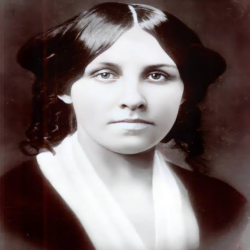
Louisa May Alcott
| Date of Birth | : | 29 Nov, 1832 |
| Date of Death | : | 06 Mar, 1888 |
| Place of Birth | : | Germantown, Philadelphia, Pennsylvania, United States |
| Profession | : | Short Story Writer, Novelist |
| Nationality | : | American |
Louisa May Alcott was an American novelist, short story writer, and poet best known for writing the novel Little Women and its sequels Little Men and Jo's Boys.
Early life
Louisa May Alcott was born on November 29, 1832, in Germantown, which is now part of Philadelphia, Pennsylvania, on her father's 33rd birthday. Her parents were transcendentalist and educator Amos Bronson Alcott and social worker Abigail "Abby" May. She was the second of four daughters: Anna Bronson Alcott was the eldest, while Elizabeth Sewall Alcott and Abigail May Alcott were the two youngest. As a child, she was a tomboy who preferred boys' games. The family moved to Boston in 1834, where Alcott's father established the experimental Temple School and joined the Transcendental Club with Ralph Waldo Emerson and Henry David Thoreau. Bronson Alcott's opinions on education, tough views on child-rearing, and moments of mental instability shaped young Alcott's mind with a desire to achieve perfection, a goal of the transcendentalists. His attitudes towards Alcott's wild and independent behavior and his inability to provide for his family created conflict between Bronson Alcott, his wife, and their daughters. Abigail reportedly resented her husband's inability to recognize her sacrifices and related his thoughtlessness to the larger issue of the inequality of sexes. She passed this recognition and desire to redress wrongs done to women on to Louisa.
Later years
In 1877, Alcott was one of the founders of the Women's Educational and Industrial Union in Boston. After her youngest sister May died in 1879, Louisa assumed the care of her niece, Lulu, who was named after Louisa. Alcott suffered chronic health problems in her later years, including vertigo. She and her earliest biographers attributed her illness and death to mercury poisoning. During her American Civil War service, Alcott contracted typhoid fever and was treated with Calomel, a compound containing mercury. Recent analysis of Alcott's illness suggests that her chronic health problems may have been associated with an autoimmune disease, not mercury exposure. However, mercury is a known trigger for autoimmune diseases as well. An 1870 portrait of Alcott does show her cheeks to be quite flushed, perhaps with the "butterfly rash" across cheeks and nose which is often characteristic of lupus, but there is no conclusive evidence available for a firm diagnosis.
Quotes
Our actions are in our own hands, but the consequences of them are not. Remember that, my dear, and think twice before you do anything.
If you feel your value lies in being merely decorative, I fear that someday you might find yourself believing that’s all that you really are. Time erodes all such beauty, but what it cannot diminish is the wonderful workings of your mind: Your humor, your kindness, and your moral courage. These are the things I cherish so in you. I so wish I could give my girls a more just world. But I know you’ll make it a better place." -- Marmee, Little Women
Painful as it may be, a significant emotional event can be the catalyst for choosing a direction that serves us - and those around us - more effectively. Look for the learning.
Some books are so familiar that reading them is like being home again.
Have regular hours for work and play; make each day both useful and pleasant, and prove that you understand the worth of time by employing it well. Then youth will be delightful, old age will bring few regrets, and life will become a beautiful success.
I often think flowers are the angels' alphabet whereby they write on hills and fields mysterious and beautiful lessons for us to feel and learn.
I want to do something splendid… Something heroic or wonderful that won’t be forgotten after I’m dead… I think I shall write books.
Love is a flower that grows in any soil, works its sweet miracles undaunted by autumn frost or winter snow, blooming fair and fragrant all the year, and blessing those who give and those who receive.
...for love casts out fear, and gratitude can conquer pride.
The humblest tasks get beautified if loving hands do them.
